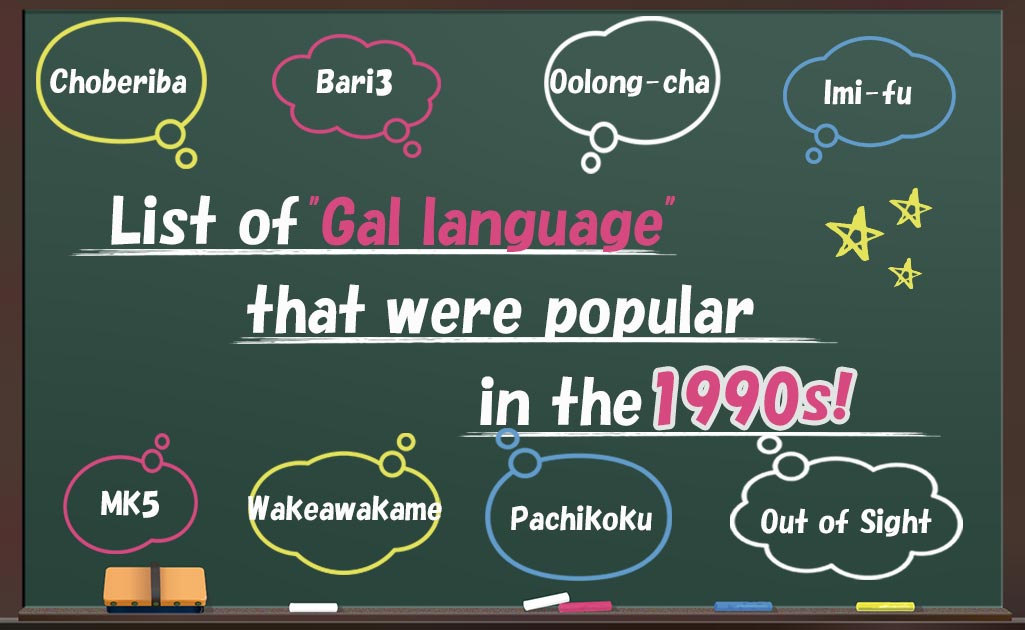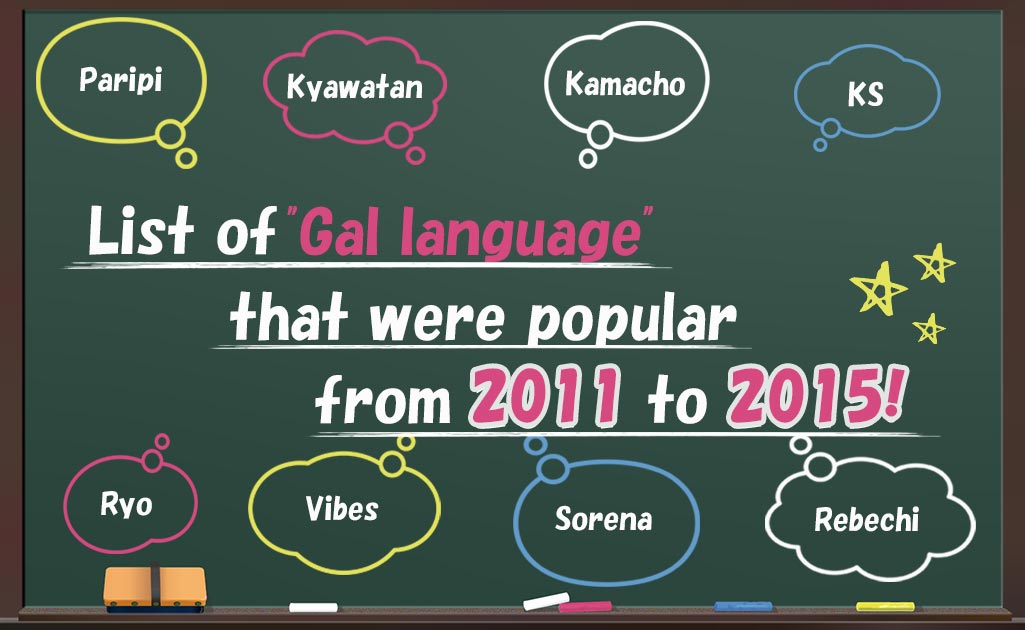Bucchake/Chakeba
"Bucchake" is a casual version of "spilling one's true feelings."
Around 2003, "Bucchake" became popular, and around 2004, the word "Chakeba" was coined.
| Bucchake |
Meaning |
Bucchake means "to be honest" or "frankly speaking." |
| Usage |
Used when revealing one's true feelings. It can be used in a casual tone, not only in serious conversations. |
| Example sentence |
To be honest (chakeba), this dish isn't tasty, is it? |
| Chakeba |
Meaning |
Originating from "bucchake banashi", which means a revealing story. |
| Usage |
Used similarly to "bucchake." |
| Example sentence |
Same as "bucchake." |
Meets
"Meets" was a word often used by "gyaru" and "gyaru guys".
Nowadays, the word is almost obsolete.
| Meets |
Meaning |
Short for "meeting."
It refers to a "conference" or "briefing."
|
| Usage |
Primarily used within "gyaru" circles during their activities.
"Meets" are held to report recent news or discuss future plans.
|
| Example sentence |
When all the members gather, we'll start the meets.
This is the first meets with these members.
|
OK Bokujou
"OK Bokujou" is famously known as a phrase often used by the former professional boxer, "Guts Ishimatsu."
Around 2004, it became widely recognized because Guts Ishimatsu used it often on TV.
| OK Bokujou |
Meaning |
A play on words combining "OK" and "ranch." |
| Usage |
Commonly used in daily conversations to agree with or approve of someone's opinion. |
| Example sentence |
A-chan: Is 7 PM good for our meeting tomorrow?
B-chan: 7 PM it is! OK Bokujou!
|
Kakiko
Nowadays, communication with a wide range of people on platforms like Twitter or Instagram is common.
But there was a time when electronic bulletin boards were used for these conversations.
"Kakiko" was a term often used online during that era.
| Kakiko |
Meaning |
Short for "write." |
| Usage |
Typically used at the beginning of a comment on blogs or threads of electronic bulletin boards. |
| Example sentence |
Hatsu kakiko → (Similar nuance to "first comment" when commenting for the first time.)
Kinen kakiko → (When wanting to leave a commemorative comment.)
|
Daa
Mainly used by girls when referring to their boyfriends.
| Daa |
Meaning |
Short for "darling."
It refers to a lover or husband.
|
| Usage |
Typically used when addressing a boyfriend or husband.
Also used when introducing one's lover or husband to a third party.
|
| Example sentence |
Daa, wake up soon~!
Let me introduce my beloved Daa.
|
KY
A word that takes the initials of the Japanese words for "air"(kuuki) and unreadable"(yomenai).
It became popular among high school girls around 2006.
Its use later spread to the general public and is occasionally used even today.
| KY |
Meaning |
Refers to someone who can't "read the room" or is socially unaware.
It carries a slightly negative connotation.
|
| Usage |
Used to describe someone who seems oblivious to their surroundings or makes others uncomfortable. |
| Example sentence |
That person is kind of KY, isn’t she? |
Panee・Pa-nai
Panee and Pa-Nai are abbreviations for "Not half-baked" → "Hanpa-nee."
It has been popular among teenagers since around 2006, and in 2009, it won 6th place in the mobile buzzword award for junior high and high school girls.
Various phrases related to " Panee " also became popular.
| Panee・Pa-nai |
Meaning |
Signifies "incredible" or "extreme." |
| Usage |
Used to express surprise or emphasize something's impressiveness. |
| Example sentence |
That guy is Panee cool! |
Bamen de
This term was popular among young people from around 2008.
| Bamen de |
Meaning |
It means "to go with the flow" or "decide based on the situation." |
| Usage |
Used when you want to decide the schedule according to the situation at the time of gathering without planning in advance. |
| Example sentence |
A: Let's meet at 13:00 tomorrow! Where should we go?
B: Bamen de! (Let's decide on the spot.)
|
Bakkureru
This term is still used in daily conversations and has been adopted by a broad age range.
| Bakkureru |
Meaning |
It means to "play dumb", "pretend not to know", or "to run away." |
| Usage |
Commonly used when intending to skip school, work, or quit a job without notice. |
| Example sentence |
I plan bakkureru the afternoon class.
Because the new part-timer bakkurerta(ran away), I can't take a break.
|
Bibiru
While "Bibiru" is a well-known term among the younger generation, it surprisingly has a long history, said to exist since the Edo period.
| Bibiru |
Meaning |
It means "to feel daunted," "to feel intimidated," or "to feel depressed." |
| Usage |
Often used when startled by sudden loud noises. Also used to express feeling intimidated or shying away from something. |
| Example sentence |
I'm seriously Bibiru by thunder.
I can't sing in public; it's too Bibiru.
|
Tekina
"Tekina" was awarded 3rd place in the 2009 Gal Trendy Word Awards and is still frequently used in daily conversation.
| Tekina |
Meaning |
By adding "Tekina" at the end of words or sentences, it makes the meaning somewhat ambiguous, translating to "kind of" or "like". |
| Usage |
Often used when wanting to be vague or even when used in a light-hearted context. |
| Example sentence |
He said something tekina(like) wanting to date, but there's been no action since. |
Naeru
Originally, "Naeru" described a decline in physical or mental strength or a withering plant.
When used by the younger generation, it tends to convey negative feelings.
| Naeru |
Meaning |
"Naeru" implies a loss of enthusiasm or waning interest. |
| Usage |
Used primarily to express negative feelings or when one is feeling down.
Some even combined "Gangan" (strongly) and "Naeru" to say "Gan-nae."
|
| Example sentence |
My much-anticipated date got canceled, so naeru(disappointing).
I gained 3kg out of nowhere. Seriously naeru(depressing).
|
Moreru
In 2009, the term "Moreru" was ranked 5th in the Gal Popular Phrases Awards and won the Gold Prize in the Female Junior High and High School Student Mobile Phone Popular Phrases Awards.
This term is frequently used in various scenes.
Even more than 10 years after it was first used, it's still a popular "Gyaru-go" (youth slang), especially among young people.
| Moreru |
Meaning |
It has two meanings:
・When you can apply makeup better than usual.
・When one looks cuter in purikura (photo booths) or photos than they usually do.
|
| Usage |
Used when one feels they look cuter than usual.
Additionally, styles like having curly hair or teased hair to add volume are referred to as "Mori-gami", often seen in gal magazines.
|
| Example sentence |
My makeup looks Moreru(super on point) today! |
Karano~
The phrase "karano~" ranked 7th in the 2009 Gal Popular Phrases Awards.
It is said to have become popular because comedians used it in skits and stand-up routines.
| Karano~ |
Meaning |
Equivalent to "and then" in English. |
| Usage |
Comedians often use a phrase structure where they end a conversation with "kara no~?" to aim for a humorous twist or unexpected remark.
However, it doesn't really have a deep meaning and can be overused since it fits various situations.
For instance, situations like "I went to xx, and after that, I'll go to xx" can be briefly conveyed using " karano~".
It's a handy phrase often seen in purikura doodles.
|
| Example sentence |
<In a conversation>
A-chan: I had a date with my crush yesterday~
B-chan: Really?! Karano~?(And then?)
<In purikura doodles>
Shopping👗 karano~(and then~) Karaoke🎤 karano~(and then~) Akakara (restaurant)🍴
|
MukaTK
The term " MukaTK " ranked 8th in the 2009 Gal Popular Phrases Awards.
| MukaTK |
Meaning |
It's a shortened version of " Mukatsuku ", with " tsuku " being converted into the initials "TK".
*"Mukatsuku" is equivalent to "disgusting" in English.
|
| Usage |
It's primarily used in emails or on social media to express feelings of annoyance or anger. |
| Example sentence |
I'm so MukaTK(annoyed) by the repeated telemarketing calls.
Nothing good has been happening lately, and it's MukaTK (annoying).
|
Gachi
The term " Gachi " was awarded 9th place in the 2009 Gal Popular Phrases Awards, but it's still commonly heard in everyday conversations.
| Gachi |
Meaning |
A simplified form of "Gachinko", meaning "serious," "genuine," or "earnest."
It's believed to originate from "Gachinko shoubu" which means "serious match" and was mainly used in sumo and professional wrestling.
|
| Usage |
While similar to "Maji de" meaning "seriously," "Gachi de" is used to express stronger emphasis or emotion. |
| Example sentence |
I'm going to study gachi de(seriously) for the exams from now on.
I gachi de(seriously) need to diet, or I won't be ready by summer.
|
Kami
"Kami" ranked 10th in the 2009 Gal Popular Phrases Awards.
Often used in phrases like "Super Kami!" or "Is Kami!", it's frequently used to convey something awesome or impressive.
| Kami |
Meaning |
It means "awesome," "amazing," or "perfect." |
| Usage |
Mostly used to describe people or things that one finds impressive.
It is often used at idol handshake events, etc., when there is a "girl who is wonderfully responsive".
|
| Example sentence |
This dessert is so delicious, it's super kami!
This handsome actor's profile is kami.
|
Otsunyan
Frequently used in blogs, "Otsunyan".
The suffix "nyan" adds a touch of cuteness to the word.
| Otsunyan |
Meaning |
A combination of "Otsukare" meaning "thank you for your hard work" and "nyan." |
| Usage |
Often found at the beginning of blog posts.
While it translates to "Thanks for the hard work," it also serves as a greeting like "Hello" or "Hey."
|
| Example sentence |
Another day done, Otsunyan!
Otsunyan! I'm looking forward to the movie tomorrow~!
|
Agepoyo/Sagepoyo
Derived from the words "Age" and "Sage."
These words were popularized by a former model of the Gal magazine egg, Kanako Kawabata.
They became explosively popular among Gals of the time.
In 2010, it was awarded the 1st place in the Gal Popular Phrases Awards and can be considered a representative Gal phrase.
| Agepoyo |
Meaning |
A term expressing a high level of excitement or enthusiasm.
The suffix "poyo" doesn't have a specific meaning on its own.
|
| Usage |
Used when feeling happy or excited. |
| Example sentence |
The person I'm into asked me out on a date! Totally Agepoyo~!! |
| Sagepoyo |
Meaning |
A term expressing a low mood or feeling down. |
| Usage |
Used when feeling down or irritated. |
| Example sentence |
My phone broke~ Sagepoyo~↓↓ |
Remember the catchy "C・H・A・R・A・M・E・G・A・N・E, I'm CharaMega♪" by Chara Shingo?
"Agepoyo" became super popular because of it!
This sparked a trend where some started adding "Poyo" to the end of their nicknames, like "Yukipoyo," "Rinapoyo," and "Akipoyo."
Nau(Now)
Often used in Twitter, blogs, and Purikura doodles, "~Nau" was a notable youth slang that ranked 2nd in the 2010 Gal Popular Phrases Awards and made it to the top ten in the New Word and Trending Word Awards of 2010.
Even in recent years on Twitter, it is frequently used with hashtags like "#Karaoke Nau," "#Gohan Nau," and "#Shopping Nau."
| Nau |
Meaning |
Derived from the English word "now," it means "right now" or "currently." |
| Usage |
By adding " Nau" to the end of a phrase, it conveys the idea of "I'm currently doing xx" or "I'm at xx now." |
| Example sentence |
Having a party with local friends nau. |
Wazu(was)
Another phrase similar to "~Nau" is "~Wazu".
Though not as commonly used nowadays, it was frequently found in blogs and Purikura doodles around 2010, much like "Nau."
| Wazu |
Meaning |
Derived from the English word "was," it indicates something that happened in the past. |
| Usage |
Like "Nau," "Wazu" is typically added to the end of a phrase.
It's used to express past actions, akin to "I've done xx" or "I went to xx."
|
| Example sentence |
Went to the gym in the morning wazu. |
Wiru(will)
Along with the trends of "~Nau" and "~Wazu," "~Wiru" also came into usage.
Since their usages are quite similar, many people found it confusing to differentiate between them.
| Wiru |
Meaning |
Derived from the English word "will," it refers to something intended for the future. |
| Usage |
It was often used in blogs and doodles.
By adding "Wiru" to the end of a phrase, it means "I plan to do xx" or "I intend to go to xx."
|
| Example sentence |
Will go to karaoke after my part-time job wiru.
Planning a double date at Disneyland wiru.
|
If you were to convert the phrase "Finished shopping and am now having lunch.
"Planning to go to karaoke afterward♪" using "Nau," "Wazu," and "Wiru," it would be "Shopping wazu→Lunch nau→Karaoke wiru."
When used as a set, "Nau," "Wazu," and "Wiru" give a similar feel to the 2009 trending phrase "Karano~," which would make the phrase "Shopping karano~Lunch karano~Karaoke."
Getton
"Getton" ranked 3rd in the 2010 Gal Popular Phrases Awards.
The term gained popularity among the younger generation because the former celebrity Yukina Kinoshita frequently used it in commercials.
| Getton |
Meaning |
A coined term that appends "n" to the end of "Get", which means "to acquire" or "to get." |
| Usage |
It's used when someone receives something or when they've acquired something they wanted.
On SNS and emails, the "Ton" in "Getton" was sometimes written as "㌧."
|
| Example sentence |
Getton a 10,000 yen coat for 5,000 yen.
Getton a cute stuffed toy from a crane game!
|
~Naken
Frequently seen in blogs and on SNS, "xx Naken " won 4th place in the 2010 Gal Popular Phrases Awards.
| ~Naken |
Meaning |
It translates to "about ~" or "regarding ~."
The nuance is similar to the commonly used business term "about ~."
|
| Usage |
It's commonly used in blog titles or bulletin board thread titles when discussing a particular topic. |
| Example sentence |
My boyfriend's sleeping face is too cute Naken.
I'll be all alone this Christmas too Naken.
|
Riajuu
"Riajuu" shined as the 5th place in the 2010 Gal Popular Phrases Awards and won the Gold Award in the 2011 Female Junior High and High School Student Mobile Phone Popular Phrases Awards.
It's a term that's widely recognized across different generations.
Did you know the term originally came from the website "2channeru"?
| Riajuu |
Meaning |
An abbreviation of the Japanese word "riaju," which means having a fulfilling life in real life.
It refers to people who seem to have a fulfilling real-life, like those with loving partners or those surrounded by friends and having fun daily.
|
| Usage |
Previously, it was used with a touch of envy or jealousy, but nowadays, it's often used with a positive connotation.
It's crucial to note that "having a partner" doesn't directly equate to being "Riajuu."
Elements such as "friends, family, work, and hobbies" can also be factors in being considered "Riajuu."
|
| Example sentence |
A: He went home with his girlfriend again today~
B: He's living the Riajuu life, huh?
----------------------------------------------------
C: I heard that person has many hobbies and is always busy.
D: Must be nice being Riajuu
|
Uma-shi/Yaba-shi
Around 2010, adding "~shi" to the end of phrases, like "Soudashi" and "Arienaishi," became a trend.
From this trend emerged Gal phrases like "Umashi" and "Yabashi."
| Uma-shi,/Yaba-shi |
Meaning |
・Umashi → "Tasty" or "Delicious"
・Yabashi → "Gosh" or "Slutty"
・Tashikashi → "Indeed"
|
| Usage |
This word is often used in daily conversations, emails, or SNS to express personal feelings. |
| Example sentence |
This pancake is seriously umashi(delicious).
I missed the last train and can't go home! Yabashi(This is bad).
|
Oni
You might have heard phrases like "Oni-yabai" or "Oni-kawaii."
This "Oni" has a different connotation from the "demons" or "ogres" known in traditional Japanese folklore.
| Oni |
Meaning |
It translates to "extremely" or "very." |
| Usage |
Adding "Oni""before a word emphasizes it:
・To stress "cute" → "Oni kawaii"
・To stress "crazy" → "Oni yabai"
While there are similar words like "Maji," "Chou," and "Geki," among them, "Oni" is used to denote the highest degree of emphasis.
|
| Example sentence |
This math equation is oni(insanely) difficult, right? |
How was it?
Have you ever heard of Gyaru language?
New words are created every year in the Gal language, and the language changes rapidly.
There are gyaru language that were popular at the time but are no longer used, and gyaru language that are still popular today.
I'm looking forward to seeing what kind of gal language will appear next.



